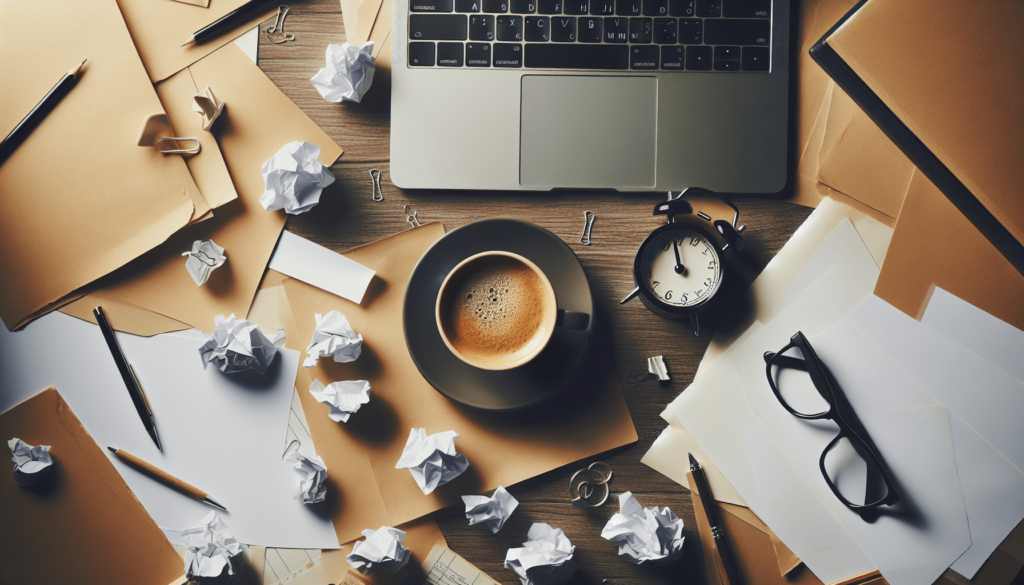Can coffee make it harder to focus? It’s a question worth pondering, especially when you consider just how many people rely on their morning cup of joe to kickstart their day. The idea that something so many people depend on to wake up and stay alert might actually be counterproductive can be quite surprising. But as with many things in life, things are not always what they seem.

Understanding Coffee’s Active Ingredient: Caffeine
The primary ingredient in coffee that affects your brain function is caffeine. Caffeine is a natural stimulant found in coffee beans, tea leaves, and some other plants. When you drink coffee, the caffeine gets absorbed into your bloodstream and travels to your brain.
How Caffeine Works
Caffeine works by blocking the effects of a neurotransmitter called adenosine. Adenosine is responsible for making you feel tired. By blocking adenosine, caffeine keeps you awake and alert. However, it’s important to note that caffeine doesn’t actually eliminate the need for sleep; it just temporarily masks the sleepiness.
Key Points on How Caffeine Works:
| Factor | Description |
|---|---|
| Neurotransmitter | Adenosine causes you to feel tired. |
| Brain Function | Caffeine blocks adenosine, making you feel alert. |
| Temporary Solution | The effects of caffeine are temporary and don’t replace the need for sleep. |
Short-Term Effects of Coffee on Focus
The short-term effects of coffee can be quite beneficial if you’re trying to focus. It can improve your mood, reaction time, and even cognitive function. Many people find that they can complete tasks more efficiently and with greater enthusiasm after a cup of coffee.
Boosting Alertness
One of the most commonly known benefits of drinking coffee is that it wakes you up. This boost in alertness can be incredibly useful when you have a tight deadline or need to stay up late.
Enhancing Cognitive Function
Caffeine can also improve specific cognitive functions such as memory, speed, and reasoning skills. These effects can certainly help you to focus better on tasks requiring mental sharpness.
Reserve Points on Short-Term Effects:
| Benefit | Example |
|---|---|
| Mood Improvement | Feeling happier and more motivated to work. |
| Enhanced Reaction Time | Quicker response during driving or playing sports. |
| Cognitive Enhancement | Better performance in tasks needing mental effort. |
The Dark Side: Potential Downsides to Coffee Consumption
While coffee has its share of benefits, it also comes with some downsides, especially if consumed in large quantities. It’s worth considering these negative effects, particularly if you find it hard to focus even after your caffeine kick.
Caffeine Crash
A caffeine crash occurs when the effects of caffeine wear off. After the high energy levels drop, you may feel extremely tired, irritated, and out of focus. This crash can be particularly challenging if you experience it in the middle of important tasks.
Anxiety and Restlessness
High doses of caffeine can lead to increased anxiety and restlessness, which can make it hard to focus. If you’re already prone to anxiety, large amounts of coffee can amplify these feelings, making concentration nearly impossible.
Insomnia
Caffeine can interfere with your sleep patterns. A lack of quality sleep can severely impact your ability to focus during the day. Even if you feel alert shortly after drinking coffee, the long-term lack of rest will catch up with you, impairing your focus and productivity.
Common Downsides:
| Downside | Symptoms |
|---|---|
| Caffeine Crash | Extreme tiredness, irritability, decreased focus. |
| Anxiety and Restlessness | Increased heart rate, jitters, nervousness. |
| Insomnia | Difficulty sleeping, waking up frequently during the night. |
Tolerance and Dependency
Another critical aspect to consider is the tolerance and dependency that can develop with regular coffee consumption.
Building Tolerance
Over time, you can build a tolerance to caffeine, meaning you need more of it to achieve the same effects. This can lead you to consume larger amounts, which only amplifies the negative effects.
Dependency and Withdrawal
Caffeine is addictive. When you become dependent on it, missing your regular dose can cause withdrawal symptoms such as headaches, fatigue, irritability, and difficulty concentrating. These symptoms can make it incredibly hard to focus, counteracting any benefits you initially gained from drinking coffee.
Tolerance and Dependency Issues:
| Issue | Description |
|---|---|
| Building Tolerance | Needing more coffee to achieve the same alertness. |
| Dependency | Relying on coffee to function normally. |
| Withdrawal Symptoms | Headaches, fatigue, irritability, lack of focus when missing a dose. |

Individual Differences: How Coffee Affects You
People are different, and how coffee affects you can depend on a variety of factors, including genetics, tolerance, and overall health. For some, a cup of coffee can improve focus and productivity. For others, the same cup can lead to jitters, anxiety, and difficulty concentrating.
Genetic Factors
Some people metabolize caffeine faster due to their genetic makeup. This can affect how long the stimulant remains in their system and how it impacts focus and alertness.
Health Conditions
For individuals with certain health conditions, such as anxiety disorders or insomnia, coffee might exacerbate their symptoms, making it even more difficult to concentrate.
Age and Tolerance
As you age, your tolerance to caffeine might change. Older adults often metabolize caffeine more slowly, affecting their sleep patterns and focus more significantly.
Key Points on Individual Differences:
| Factor | Impact |
|---|---|
| Genetic Makeup | Speed of caffeine metabolism, length of effect. |
| Health Conditions | Exacerbation of anxiety, insomnia, etc. |
| Age and Tolerance | Slower metabolism in older adults, changes in focus levels. |
Practical Tips for Optimizing Coffee Consumption
If you enjoy coffee and want to make the most of its benefits while minimizing its downsides, consider these practical tips.
Timing is Everything
Try to drink your coffee during the earlier parts of the day. Drinking coffee late in the afternoon or evening can interfere with your sleep, leading to decreased focus the next day.
Quality Over Quantity
Perhaps it’s time to pay attention to the quality of the coffee you are drinking. High-quality coffee might have fewer impurities and toxins, which can make a difference in how you feel.
Stay Hydrated
Coffee is a diuretic, which means it can lead to dehydration if you’re not careful. Make sure you’re also drinking plenty of water throughout the day to stay hydrated and keep your focus sharp.
Combine with Healthy Habits
Caffeine should not be a substitute for healthy habits. Ensure you are getting enough sleep, eating balanced meals, and incorporating exercise into your routine to maintain optimal focus and productivity.
Practical Tips Summary:
| Tip | Description |
|---|---|
| Timing | Drink coffee earlier in the day to avoid disrupting sleep. |
| Quality Over Quantity | Opt for high-quality coffee to reduce impurities and toxins. |
| Stay Hydrated | Drink plenty of water to counteract coffee’s diuretic effects. |
| Healthy Habits | Maintain overall well-being with sufficient sleep, balanced diet, and exercise. |
Alternatives to Coffee
If you find that coffee makes it harder for you to focus, or you simply want to experiment with other options, there are plenty of alternatives that can provide a similar energy boost without the downsides.
Green Tea
Green tea contains caffeine but in smaller amounts than coffee. It also has L-theanine, an amino acid that promotes relaxation and can counteract the jittery effects of caffeine.
Herbal Tea
Herbal teas are generally caffeine-free and can offer various health benefits. Herbal options like chamomile or peppermint can help you relax and stay focused without the risk of a caffeine crash.
Water with Lemon
Sometimes, simple solutions can be just as effective. A glass of water with a splash of lemon can be invigorating. Staying hydrated with this refreshing drink can help you maintain focus throughout the day.
Alternatives Summary:
| Alternative | Benefits |
|---|---|
| Green Tea | Contains some caffeine and L-theanine for a balanced, relaxed alertness. |
| Herbal Tea | Caffeine-free, helps in relaxation, and improves focus. |
| Water with Lemon | Hydrating and refreshing, easy to make. |
When to See a Professional
If you realize that coffee significantly impacts your ability to focus, it might be time to consult a healthcare professional. This is especially true if you’re experiencing extreme symptoms like severe anxiety, chronic insomnia, or uncontrollable caffeine addiction.
Assessing Impact
Write down your coffee consumption and how you feel throughout the day. This can help you identify patterns that you can share with your healthcare provider.
Seeking Help
Don’t hesitate to seek professional advice if you’re struggling. A healthcare provider can offer personalized recommendations to improve your focus and overall well-being.
Professional Help Summary:
| Step | Action |
|---|---|
| Assessing Impact | Track your coffee consumption and associated symptoms. |
| Seeking Help | Consult with a healthcare provider for personalized guidance. |
Conclusion
So, can coffee make it harder to focus? The answer is nuanced. While coffee can provide a short-term boost in alertness and cognitive function, over-reliance on it can lead to a host of issues, including anxiety, restlessness, and even decreased focus due to caffeine crashes. Everyone’s experience with coffee is unique, and many factors, such as genetics, health conditions, and tolerance levels, can affect how it impacts your ability to concentrate.
By understanding both the positive and negative effects of coffee, you’ll be better equipped to make informed choices about your coffee consumption. Employ practical tips to optimize its benefits while minimizing its downsides, and don’t hesitate to explore alternative beverages that might offer you better focus without the risks.
Remember, balance is key. Whether you choose to continue drinking coffee or try something new, your best chance at maintaining optimal focus lies in a holistic approach. Prioritize good sleep, a balanced diet, and regular exercise, and you’ll likely find that you need less caffeine to stay sharp and alert throughout the day.
